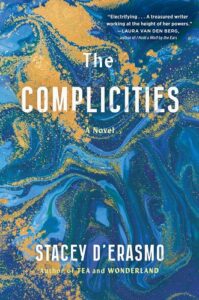While I’m an unabashed fan of straight-up mysteries—see: the high stack of Simenon in my house, along with the works of Elizabeth Hand, P.D. James, John le Carre, and Stieg Larsson; more than one paperback picked up in an airport bookstore; and roughly ten million police procedurals and Nordic noirs in my streaming history—my deepest love is for mysteries and thrillers that remain mysterious even after the final scene. Sometimes you don’t know who did it, or even what was done; sometimes you know who did it, but will never quite be able to pass judgment on why and what the consequences were; sometimes you, reader, feel implicated as well. The gray areas call to me to come closer, right up to the edge of what may or may not be very wrong. A mystery solved is satisfying, but murkiness, ambiguity, and the slipperiness of power seem to me more true to the human condition: none of us is as good, or sometimes as bad, as we might imagine ourselves to be. Here are a few of my greatest hits of moral unease.
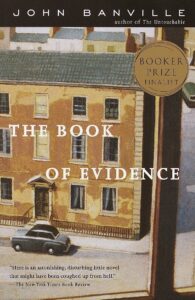
The Book of Evidence, by John Banville
You may know that Banville is also Benjamin Black, author of a successful series of terrific, conventional mysteries set in 1950s Dublin, but in The Book of Evidence from 1989, Banville as Banville turned his abundant literary imagination to one Freddie Montgomery, a murderer who is writing a confession—or is it an apologia? Montgomery has a turbulent inner life, a spectacular way with words, and troubles, terrible troubles, that really are not his fault. While he did, yes, murder someone, there were circumstances. He can explain. And he does, in prose that is as exhilarating as it is profoundly unsettling.
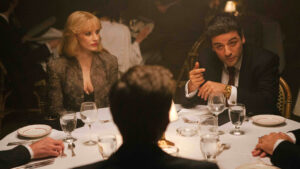
A Most Violent Year, 2014 film, directed by J.C. Chandor
Oscar Isaac plays Abel Morales, who owns a trucking company in 1980s New York, and Jessica Chastain plays his wife, Anna. Abel is in the heating oil business, which, as the film makes clear, is dirty through and through. Albert Brooks plays against type as Abel’s canny attorney. At every turn, Abel has to make a decision between something bad and something worse. Isaac as Abel spends a lot of the movie saying, “I try to do the most right thing,” but that’s a big gray area, as it turns out. As the film goes on, one becomes less certain if he’s drowning or keeping his head just above water. Saving his soul or losing it? The film stays exactly on that edge, all the way to the darkly ambiguous ending.
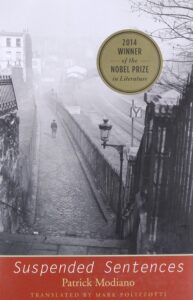
Suspended Sentences, by Patrick Modiano
Really, I mean all of Modiano’s work, but you could start with these three novellas in which mysteries and suspiciously large gaps in memory abound, but are never resolved. Set in Paris, often in the early 1960s, these novellas are written with highly deceptive clarity and simplicity: precisely delineated streets, dates, and photographs conjure a world that you can see quite clearly, but what has happened on those streets and dates, and in those photos? The narrator often can’t remember, and what did he or others do in the war? Who was a thief, who a black marketer, who a collaborator, who a member of the Resistance, and when so-and-so disappeared, what happened? Something is missing. Something can’t be recalled. There are holes in every story, and those holes, it turns out, are the story. Modiano won the Nobel Prize in 2014, not for solving mysteries, but for leaving them unsolved.

Passing, by Nella Larsen
Larsen’s classic novel of the profound, roiled bond between two women in 1920s Harlem—one passing as white, the other an upstanding doyenne of the Harlem Renaissance—isn’t usually shelved with, say, Highsmith. But as the relationship between Clare (the passing one) and Irene (the doyenne) unfolds, strong currents of fascination, betrayal, and identification rush between them uncontrollably. At the end—no avoiding this spoiler, sorry—Clare goes out a window to her death, but did Irene push her? Did she jump? Did her racist white husband do it? What has actually happened between these two women? In Rebecca Hall’s elegant 1921 film of the novel, the tiniest flicker of a shot of Irene’s arm around Clare’s waist just before Clare falls suggests maybe protection, maybe a shove, maybe an embrace, all at once. Or, as Larsen puts it in the book, “What happened next, Irene Redfield never afterwards allowed herself to remember.” Nor does the novel, leaving the reader swaying in the ambivalence of Clare’s and Irene’s intimacy.
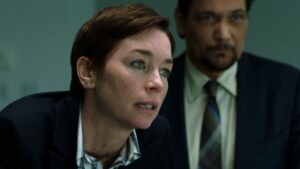
Who We Are Now, 2017 film, directed and written by Matthew Newton
A killer performance by Julianne Nicholson, playing a woman who has, in fact, killed someone and is just being released from prison after ten years. She’s desperate to regain custody of her son, despite the bad decisions she’s made in the past and continues to make. As much as you root for her, you also sometimes fear equally that she’ll succeed in her quest. The movie never collapses, or allows the viewer to collapse, into an easy tale of redemption. Nicholson’s character: victim, villain, heroine? Yes.

The Quiet American, by Graham Greene
Greene loved a tangled geopolitical thriller, but perhaps never more so than in this 1955 novel, which has made readers uncomfortable from the moment it was published. First-person narrator Thomas Fowler, a seasoned British journalist, meets up with young CIA operative Alden Pyle in 1950s Vietnam. Fowler is also involved with a younger Vietnamese woman named Phuong, who becomes involved with Pyle as well. Pyle, fully believing he knows best for Vietnam, wreaks incredible damage in all directions, but Fowler, our appalled narrator, might not be much better in the end in his attempts to curtail Pyle. Phuong deserves a novel of her own, as she is more or less just a point in what becomes a love triangle; one wonders what she might say or do, given a chance. Meanwhile, America and Britain blunder around, making some of their worst decisions on the basis of what they think of as their highest principles. The novel has been adapted for film twice, once in 1958 (when, to Greene’s horror, it was turned into an anti-communism thriller with Pyle as American hero) and once in 2002. The second version actually first premiered on September 10th, 2001, but Miramax pulled it after September 11th, fearing it would be seen as unpatriotic. Michael Caine plays Fowler in the 2002 film—that should tell you everything you need to know about the world-weary face of ambiguity here.
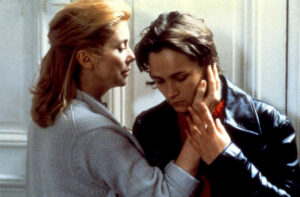
Les Voleurs (Thieves), 1996 film, directed by Andre Techine
One of the best films of gray areas, and among French auteur Techine’s best as well, although it’s only available, without subtitles, on DVD. Consider this a plea for someone to stream this beauty, about a family of thieves, featuring Daniel Auteil and Catherine Deneuve. Auteil plays the one member of the family who has become a cop. When a heist goes wrong and his crime boss brother is murdered, Auteil is on the case, but alliances and hearts are tangled every whichway, not least because he and Deneuve, playing a philosophy professor, are involved with the same woman, a criminal as well who played a key part in the bad heist. What is crime, what is love, what is sex, what is family, what is justice? What is the most right thing? The characters and the film circle around these questions, vexed and fallible. The questions may seem simple—who did it? how did this happen?—but the answers never are.
***


